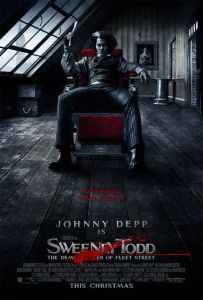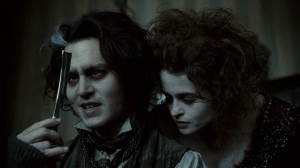
Rating- B+/ Normally, I’m not the biggest fan of Westerns. I occasionally like to watch one with my dad, but they’re not typically my favorite genre, or my second favorite genre, for that matter. That said, the premise for Bone Tomahawk immediately caught my interest. A western? Pfft. With hill-dwelling cannibals? Huh. With cannibals and a bit of the old ultra-violence? Gentlemen, you had my curiosity. now you have my attention. I just had to watch it.
My level of interest was increased exponentially by the presence of Richard Jenkins, a veteran character actor I’ve loved and admired since my early teen years, when I saw him in Burn After Reading and The Visitor. But really, like any other of the ubiquitous American character actors that blend into small roles in big movies every year, I’d seen him so many times before that. And let me tell you, this movie started out with a bang.
Rather than being a straight-out slow burn, Bone Tomahawk starts out cuckoo and then slows down around the middle to reflect on it’s themes and characters, then becomes balls-out sadistic in it’s final act. Some people think the 2/3 part drags, but I would not be among them. How can a movie drag with such a great cast of actors and characters. If you want to flat-out categorize this as a horror-western, then Bone Tomahawk has something 99.9% of contemporary horror movies lack- it makes you give a damn about it’s protagonists. Which is something in this day and age as rare as Aztec Gold.
Sheriff Hunt (Kurt Russell) is the cool-as-a-cucumber man of the law in a tiny town in the old West ironically dubbed ‘Bright Hope,’ this moniker being ironic because three people have just been abducted from Bright Hope by feral hill people who also happen to be inbred cannibals. Arthur (Patrick Wilson) is the happily married man and former cowboy whose wife Samantha (Lili Simmons) is abducted by the psychos.
This comes at a particularly bad time for him (not that there’s any particularly good time to have your wife kidnapped by cannibals) because Arthur has recently broken his leg falling off a roof and must decide whether to go after her in his current condition or stand by impotently while the love of his life gets eaten by hill people. Except for Arthur, there’s no deciding about it. He’s going, man.
Arthur and Hunt are accompanied by Brooder (Lost‘s Matthew Fox), an racially biased flirt and Chicory (Richard Jenkins,) a chatty eccentric and Hunt’s right hand man despite his rapidly advancing age. Together they have no idea what they’re getting into, and personalities clash when Brooder’s abrasive nature, lack of compassion, and casual racism butts up against the others’ surprisingly Liberal values. Added to the explosive mix is Arthur’s hotheadedness when it comes to saving his wife his way and his powerlessness when dealing with his broken leg. Not to mention how fast the posses’ horses get stolen by Mexican bandits. How could this situation go wrong? Add conflict, injury, and homicidal cannibal nutcases and stir well. Let simmer.

Bone Tomahawk is an exceptionally well-written and well-thought out horror movie that happens to have a few scenes that rival the fucking Human Centipede in gore factor. And I’m not talking the surprisingly tame Human Centipede I. I’m talking Human Centipede II, with Martin tearing out peoples’ tendons, baby. Except this movie offers more in the dialogue department than the THC movies. Not that that would be hard.
The conversations the characters have in their blooddrenched journey is fairly idiosyncratic, a little Tarantino-esque, but with a verve of it’s own. Subjects such as flea circuses and reading in the bath might seem a little random and out of context until you realize no, they make more sense than you originally suspected. Slowly, the pieces of the narrative start to fall into place, the good, the gory, and the weird.
And boy, is this movie gory. There was one death in particular (you’ll know it when you see it) that had me squirming in my seat. And I am not a prude. Depending on your threshold for really bloody movies, this might have you cheering or running in the other direction. The violence is really raw and sadistic, definitely not for everybody, or even most people for that matter. But it’s not all about the gore here. The filmmaker, a first-time director named S. Craig Zahler, has more tricks up his sleeve than just wanton brutality.
Although the characters’ lack of true shock and horror at the events unfolding rapidly in front of them seems kind of unlikely given the circumstances (they seem disturbingly calm after having someone disemboweled in front of them, not a likely reaction for anyone who isn’t a hardcore psychopath,) this movie is for anyone who’s wanted to see the Western genre done a little differently, but with a deft hand in terms of dialogue and character development.
The miracle of Bone Tomahawk is that it utterly keeps your attention and your investment in it’s characters alive for it’s 2+ hour runtime. That’s no mean feat for a first-time director who allegedly was told my many people prior to filming that this movie couldn’t be done. Maybe they should have spent more time making their own movies and less time arguing that Zahler couldn’t see this project to completion. But as Taylor Swift wisely said, the haters gonna hate, and this film is evidence of their failure to sway the dream of a potential-packed filmmaker with a bright future.









